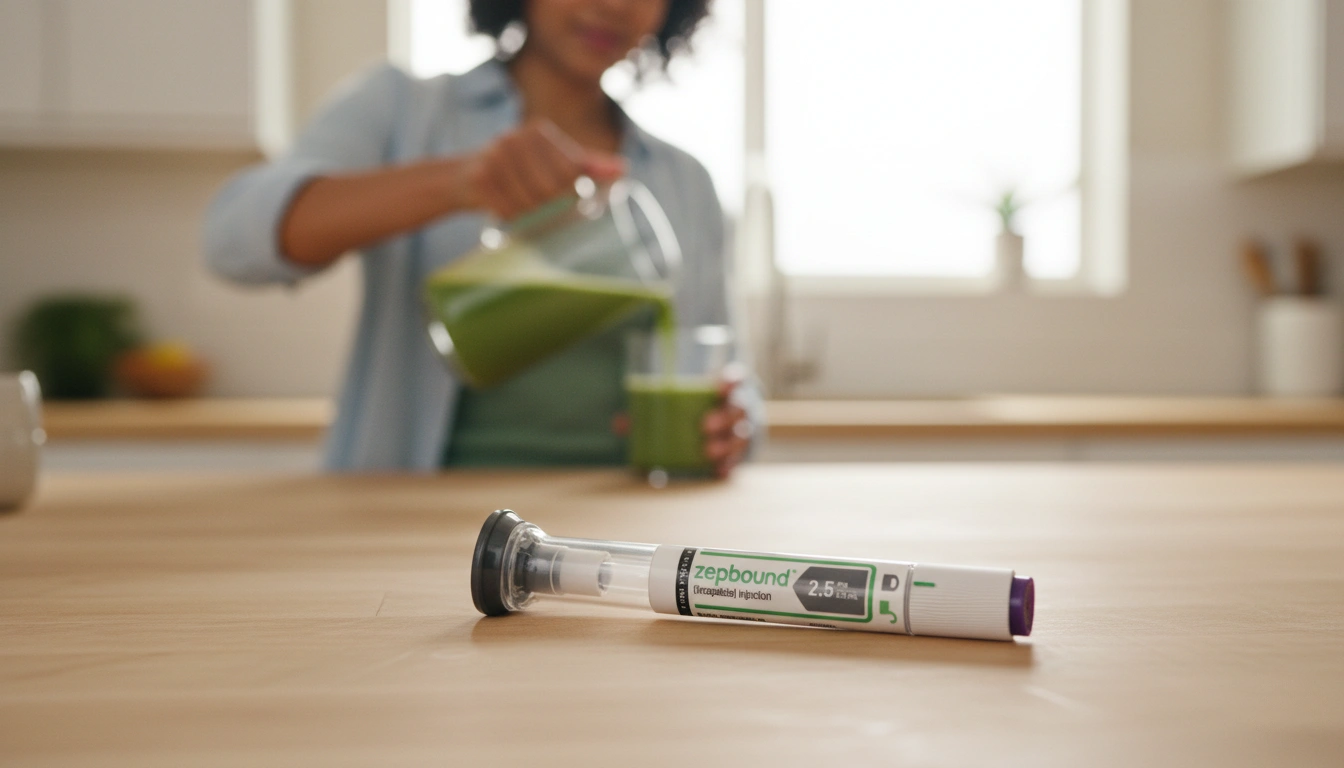Why Increase Zepbound Dose: Understanding the Key Factors

Introduction
Weight loss is often a challenging journey; for many, it feels like a marathon rather than a sprint. Did you know that, on average, individuals may experience periods of weight loss plateauing despite their best efforts? This reality can be frustrating and may lead to questions about the effectiveness of treatments like Zepbound (tirzepatide).
Zepbound is an innovative medication designed to aid adults struggling with obesity or overweight issues, particularly when coupled with weight-related medical conditions. As we explore the intricacies of weight management, we will dive into why someone might consider increasing their Zepbound dose.
In this blog, we will discuss various scenarios that may warrant a dosage adjustment, the importance of professional guidance, and how TrimRx can support your personalized weight loss journey. By the end of this post, you will have a comprehensive understanding of when and why it might be necessary to increase your Zepbound dose.
Understanding Zepbound
Before discussing dosing adjustments, let’s clarify what Zepbound is and how it works. Zepbound is an injectable prescription medication that operates as a dual GIP (glucose-dependent insulinotropic polypeptide) and GLP-1 (glucagon-like peptide-1) receptor agonist. This powerful combination helps regulate appetite, leading to reduced food intake, which is crucial for effective weight management.
Zepbound is typically administered once a week through subcutaneous injections in the abdomen, thigh, or upper arm. The standard dosing begins at a low level—often 2.5 mg—before gradually increasing based on individual progress and tolerability.
Why Consider an Increase in Zepbound Dose?
There are several key factors and situations that might indicate the need to increase your Zepbound dose. Let’s explore these scenarios in detail.
1. Weight Loss Progress Has Slowed
One of the most common reasons for considering a dose increase is when weight loss progress slows or plateaus. Weight loss is not linear; fluctuations are normal. However, if you have maintained a balanced diet and consistent exercise routine yet find that the scale isn’t moving, it may be time to discuss potential adjustments with your healthcare provider.
- What to Consider: Assess your lifestyle habits, including dietary patterns and physical activity levels. Your healthcare provider will want to ensure that other factors—such as stress, sleep, and any other health conditions—are also taken into account before making any changes.
2. Blood Sugar Management Needs Improvement
For individuals using Zepbound to assist with blood sugar control, an increase in dosage may be appropriate if blood glucose levels aren’t meeting established goals. Regular monitoring of blood sugar levels is essential, and if your readings are consistently above target, it could signal the need for a dose adjustment.
- Collaboration is Key: Discuss your blood sugar management goals with your healthcare provider, who will evaluate your overall health picture, including your diet and lifestyle strategies, to determine the best course of action.
3. Current Dose is Well-Tolerated
If you are handling your current Zepbound dose without significant side effects, it could indicate readiness for an increase. Tolerance of the medication is a crucial factor in considering a dose adjustment.
- Monitoring Side Effects: Your healthcare provider will want to know about any side effects or experiences you have had on your current dose. This feedback is vital for determining whether to increase your dosage safely.
4. Changes in Appetite Control
If you notice that Zepbound is becoming less effective in managing your appetite over time, discussing a dose increase with your healthcare provider may be beneficial. This situation can happen as your body adjusts to the medication.
- Open Communication: Share any changes in your appetite and cravings with your healthcare provider. They may also recommend additional strategies to help maintain appetite control alongside any potential medication adjustments.
5. Following the Prescribed Treatment Schedule
Sometimes, increasing your Zepbound dose is simply part of your prescribed treatment plan. Your healthcare provider will discuss your personalized dosing schedule and explain when to expect potential adjustments based on your progress and goals.
- Regular Check-Ins: Schedule routine appointments with your healthcare provider to monitor your progress and make any necessary adjustments to your treatment plan. This proactive approach ensures that you receive the support you need throughout your weight loss journey.
The Importance of Professional Guidance
While it may be tempting to adjust your medication on your own, it is crucial to maintain open communication with your healthcare provider. Any changes to your Zepbound dosage should only occur under professional supervision to ensure both safety and effectiveness. Self-adjusting doses can lead to unwanted side effects or diminished treatment efficacy.
When to Contact Your Healthcare Provider
You should reach out to your healthcare provider if you experience:
- A noticeable slowdown in weight loss despite adherence to dietary and exercise recommendations.
- Blood sugar levels that remain consistently high and require adjustments.
- Significant changes in appetite or well-being.
- Any side effects that are persistent or concerning.
By keeping your healthcare provider informed of these changes, they can help guide you through your treatment journey and determine the best approach for your weight management goals.
TrimRx: Your Partner in Weight Management
At TrimRx, we understand the complexities of weight management and the importance of personalized care. Our mission is to empower individuals to embrace healthier lifestyles through clinically proven, tailored weight loss solutions. We combine advanced medical science with compassionate support, ensuring that each person receives the care they need to achieve sustainable weight loss.
If you’re considering Zepbound as part of your weight loss journey, we encourage you to take our free assessment quiz to determine your eligibility for our prescription weight loss medications. By understanding your unique needs and medical history, we can provide a personalized treatment plan that aligns with your goals.
Take our free assessment quiz today: Start Here.
Additionally, we offer quick-access supplements designed to support your weight loss journey, including our GLP-1 Daily Support and Weight Loss Boost. These supplements can serve as valuable tools to enhance your overall wellness while using Zepbound.
- GLP-1 Daily Support: Learn More
- Weight Loss Boost: Discover More
Conclusion
In summary, understanding when to increase your Zepbound dose is essential for maximizing the effectiveness of your weight loss treatment. Whether you experience a plateau in weight loss, struggle with blood sugar management, or notice changes in appetite control, collaborating closely with your healthcare provider will ensure that your journey toward better health remains on track.
At TrimRx, we are dedicated to providing compassionate, personalized care and innovative solutions tailored to your unique needs. We invite you to explore our services and resources as you embark on your weight management journey.
FAQs
Why do you need to increase Zepbound dose during weight loss treatment?
You increase Zepbound dose to maintain effectiveness as your body adapts, with understanding the key factors showing progressive escalation maximizes weight loss results. TrimRx explains why you increase Zepbound dose by teaching understanding of the key factors including tolerance development and therapeutic optimization throughout treatment.
What are the key factors for understanding why to increase Zepbound dose?
Key factors for understanding why to increase Zepbound dose include weight loss plateaus, returning appetite, and reaching tolerance at current levels. TrimRx identifies understanding the key factors that determine why you increase Zepbound dose, ensuring escalation decisions are based on clinical indicators rather than arbitrary timing.
Why increase Zepbound dose if I am still losing weight at my current level?
You may not need to increase Zepbound dose if still losing weight effectively, with understanding the key factors showing escalation is unnecessary when achieving goals. TrimRx helps determine why or why not to increase Zepbound dose through understanding the key factors of individual response and progress toward target weight.
Is understanding the key factors for why to increase Zepbound dose important for success?
Understanding the key factors for why to increase Zepbound dose is crucial for optimizing treatment success and avoiding unnecessary escalation or stagnation. TrimRx emphasizes that knowing why you increase Zepbound dose through understanding the key factors ensures appropriate timing and maximizes therapeutic benefits safely.
Why increase Zepbound dose when understanding key factors shows side effects are challenging?
You should delay increasing Zepbound dose when understanding the key factors reveals side effects are poorly managed, prioritizing tolerability over escalation. TrimRx evaluates why not to increase Zepbound dose in certain situations, teaching understanding of the key factors that may warrant staying at current levels longer.
What key factors indicate why you should increase Zepbound dose now?
Key factors indicating why to increase Zepbound dose include minimal side effects, weight loss stall, and adequate time at current level for assessment. TrimRx uses understanding of these key factors to determine why you should increase Zepbound dose, ensuring readiness for higher therapeutic levels.
Why increase Zepbound dose to maximum levels when understanding key factors of individual needs?
You increase Zepbound dose to maximum when understanding the key factors shows you need strongest effects to reach goals and can tolerate escalation. TrimRx personalizes why you should increase Zepbound dose by understanding the key factors of your specific weight loss requirements and metabolic response.
Does understanding key factors explain why some people increase Zepbound dose faster than others?
Understanding the key factors explains why some increase Zepbound dose faster based on superior tolerance and aggressive weight loss timelines versus cautious approaches. TrimRx clarifies why individual pace to increase Zepbound dose varies through understanding the key factors affecting personal escalation schedules and treatment goals.
Why increase Zepbound dose when understanding key factors of medication cost and supply?
You might delay increasing Zepbound dose when understanding the key factors of cost constraints, though efficacy should generally guide escalation decisions. TrimRx discusses why financial key factors affect whether to increase Zepbound dose, balancing understanding of cost considerations with optimal treatment outcomes.
How does understanding the key factors help me know exactly why to increase my Zepbound dose?
Understanding the key factors provides clear rationale for why to increase Zepbound dose based on clinical indicators rather than guesswork or arbitrary schedules. TrimRx teaches comprehensive understanding of the key factors determining why you should increase Zepbound dose, empowering informed decisions throughout weight loss therapy.
Will increasing my dose help if my weight loss has completely stopped?
Dose increases often restart weight loss during plateaus by providing stronger appetite suppression and metabolic effects at higher medication levels. However, evaluate dietary adherence and activity levels first, as lifestyle factors may be causing the stall rather than insufficient medication.
Can I increase my dose every 2 weeks instead of monthly?
Standard protocols recommend 4-week intervals between increases to allow adequate tolerance assessment and response evaluation at each level. Rushing escalation with 2-week intervals increases side effect risks and prevents accurate determination of optimal dosing for your needs.
What if my provider wants to increase my dose but I want to stay longer at my current level?
Open communication with your provider is essential, as staying at your current dose longer is reasonable if achieving satisfactory results. Dose increases should be collaborative decisions considering both clinical indicators and your personal comfort with treatment progression.
Will increasing my dose cause me to regain tolerance and need even higher doses later?
Each dose increase provides renewed therapeutic effects, though some patients develop tolerance over many months requiring further escalation. Most people find an optimal maintenance dose where benefits stabilize without needing continuous increases indefinitely.
Should I increase my dose if I am only losing half a pound per week?
Half a pound weekly represents sustainable, healthy weight loss that may not require dose increases if you are satisfied with this pace. However, if seeking faster results and tolerating current doses well, escalation could accelerate progress toward your goal weight.

Transforming Lives, One Step at a Time
Keep reading
Navigating Your Path: How Many Doses Are In Zepbound and What It Means for Your Health Journey
Curious how many doses are in Zepbound? Discover its weekly dosing schedule, available strengths, and titration process for effective weight loss. Learn more!
Navigating Your Zepbound Journey: Understanding Dosing and Expert Guidance
Wondering how to split doses of Zepbound? Learn why it’s unsafe & not recommended. Get expert guidance on Zepbound dosing for safe, effective weight loss with TrimRx. Click to learn more!
Understanding Zepbound Dosing: What is the Lowest Dose Available for Your Weight Loss Journey?
Curious what is the lowest dose of Zepbound available? Learn about Zepbound’s 2.5mg starting dose, titration, and safe use for weight loss. Get expert guidance!



